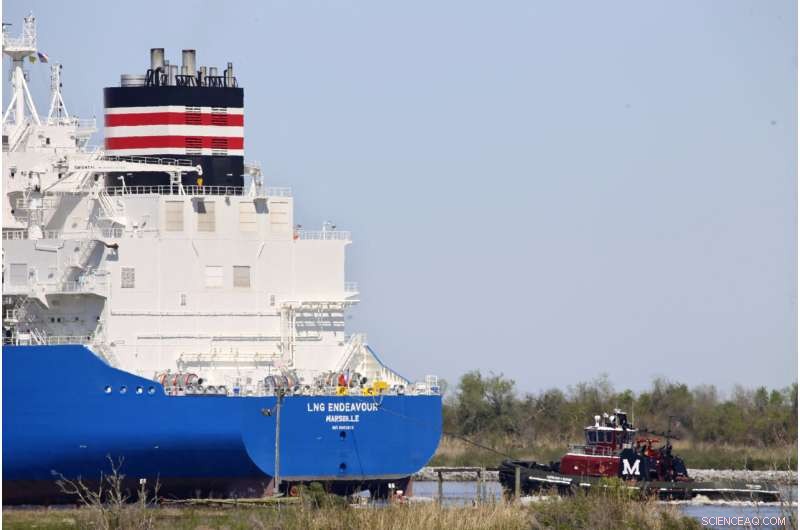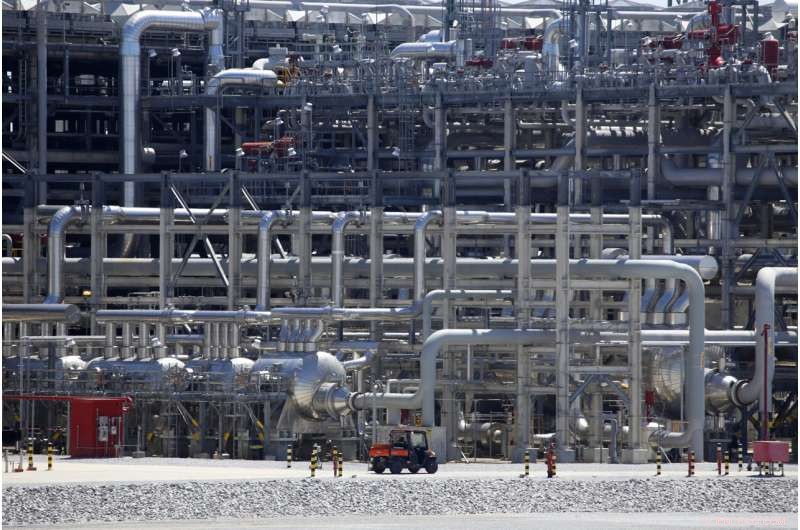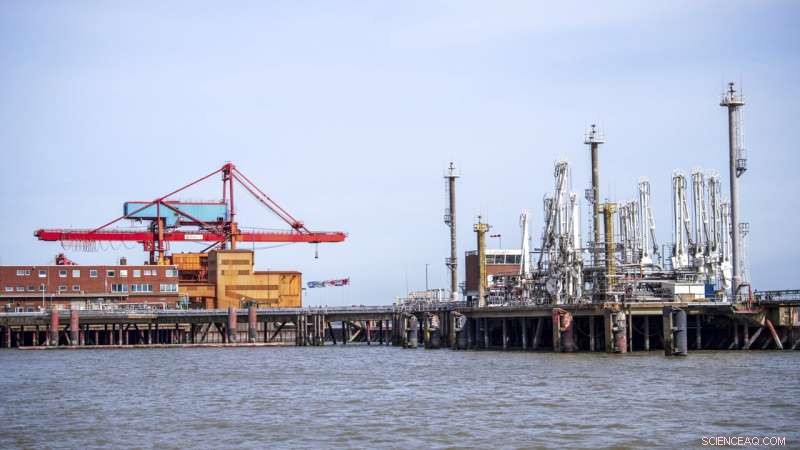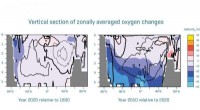
Wetenschap
Europa plan voor drijvende gasterminals wekt angst voor klimaat

Een sleepboot helpt een Frans schip, bekend als de LNG Endeavour, op 31 maart 2022 door het Calcasieu-meer bij Hackberry, La. lang voorzien. Nu de winter nadert, steunen Europese landen een kortetermijnoplossing die voor het einde van 2022 moet beginnen en die alarm heeft geslagen bij wetenschappers die bang zijn voor de langetermijngevolgen voor het klimaat. Krediet:AP Photo/Martha Irvine, Bestand
Nu de winter nadert, hebben Europese landen, wanhopig om het aardgas dat ze ooit uit Rusland kochten, te vervangen, een kortetermijnoplossing omarmd:een reeks van ongeveer 20 drijvende terminals die vloeibaar aardgas uit andere landen zouden ontvangen en omzetten in brandstof voor verwarming.
Toch heeft het plan, met de eerste drijvende terminals die tegen het einde van het jaar aardgas zullen leveren, alarm geslagen bij wetenschappers die bang zijn voor de langetermijngevolgen voor het milieu. Ze waarschuwen dat deze terminals Europa's afhankelijkheid van aardgas zouden bestendigen, dat klimaatverwarmend methaan en koolstofdioxide vrijgeeft wanneer het wordt geproduceerd, getransporteerd en verbrand.
Sommige wetenschappers zeggen dat ze zich zorgen maken dat de drijvende terminals op de lange termijn een leverancier zullen worden van Europa's enorme energiebehoeften, die jaren, zo niet tientallen jaren kan duren. Een dergelijke trend zou de inspanningen om de uitstoot te verminderen, kunnen terugdraaien die volgens experts niet snel genoeg zijn gegaan om de schade aan het wereldwijde milieu te vertragen.
Een groot deel van het vloeibaar aardgas, of LNG, dat Europa hoopt te ontvangen, zal naar verwachting uit de Verenigde Staten komen. De behoefte ontstond nadat de Russische invasie van Oekraïne zijn banden met Europa verbrak en leidde tot een afsluiting van het grootste deel van het aardgas dat Moskou al lang had geleverd. Langs de Amerikaanse Golfkust breiden exportterminals zich uit en veel inwoners daar zijn verontrust over de toename van het boren naar gas en het resulterende verlies van land, evenals extreme weersveranderingen in verband met de verbranding van fossiele brandstoffen.
"Door deze immense LNG-infrastructuur te bouwen, zal de wereld de komende decennia blijven vertrouwen op fossiele brandstoffen en blijvende klimaatschade", zegt John Sterman, klimaatwetenschapper aan het Massachusetts Institute of Technology.
Aardgas draagt aanzienlijk bij aan klimaatverandering - zowel wanneer het wordt verbrand, kooldioxide wordt, als door lekkages van methaan, een nog krachtiger broeikasgas. Toch hebben Europese landen, die al jaren toonaangevend zijn in het overschakelen op schonere energie, voorgesteld om meer dan 20 drijvende LNG-terminals naar hun havens te brengen om het verlies aan Russisch aardgas te compenseren.
De terminals, die boven huizen uittorenen en zich uitstrekken over bijna 304 meter, kunnen ongeveer 170.000 kubieke meter LNG opslaan en omzetten in gas voor woningen en bedrijven. Ze kunnen sneller en goedkoper worden gebouwd dan onshore importterminals, hoewel ze volgens de International Gas Union duurder in gebruik zijn.
"Elk land moet zich voorbereiden op een scenario waarin de Russische bevoorrading mogelijk wordt verminderd", zegt Nikoline Bromander, analist bij Rystad Energy. "Als je afhankelijk bent, moet je een back-upplan hebben."

A flare burns at Venture Global LNG in Cameron, La., on April 21, 2022. Russia’s war against Ukraine shattered its relations with Europe, which soon lost most of the natural gas that Moscow had long provided. Now, as winter nears, European nations have backed a short-term fix set to begin before the end of 2022 that has raised alarms among scientists who fear the long term consequences for the climate.Credit:AP Photo/Martha Irvine, File
Many environmental scientists argue that the money being earmarked for the ships—which cost about $500 million each to build, according to Rystad—would be better spent on rapidly adopting clean-energy or efficiency upgrades that could reduce energy consumption.
Constructing more solar or wind farms, which takes years, wouldn't immediately replace Russian gas. But with adequate funding, Sterman suggested, greater energy efficiencies—in homes, buildings and factories, along with the deployment of wind, solar and other technologies—could vastly reduce Europe's need to replace all the gas it's lost.
Germany, among Europe's strongest advocates for the floating LNG terminals, is expecting five of the ships and has committed roughly 3 billion euros to the effort, according to Global Energy Monitor. Germany has also approved a law to fast-track the terminals' development, suspending the requirement for environmental assessments.
It's a move that troubles environmental groups.
"It's totally obvious," asserted Sascha Müller-Kraenner, CEO of Environmental Action Germany, that "the provisions of the law were developed in close dialogue with the gas industry."
Germany's government and energy industry have defended their embrace of the LNG terminals as an urgent response to the loss of most of the Russian gas they had long received, which they fear Moscow will shut off completely.
"In an exceptional situation such as this, where it's a matter of Germany's gas supply security, it is justified to accelerate the approval process," Germany's energy industry association, BDEW, said in a statement.
Susanne Ungrad, a spokeswoman for Germany's Economy and Energy Ministry, noted that efforts are being made to lower methane emissions in exporting countries like the United States. And she said that in pursuing the construction of LNG terminals, Europe authorities will conduct comprehensive assessments.

A small vehicle drives past a network of piping that makes up pieces of a "train" at Cameron LNG export facility in Hackberry, La., on March 31, 2022. Russia’s war against Ukraine shattered its relations with Europe, which soon lost most of the natural gas that Moscow had long provided. Now, as winter nears, European nations have backed a short-term fix set to begin before the end of 2022 that has raised alarms among scientists who fear the long term consequences for the climate. Credit:AP Photo/Martha Irvine, File
Greig Aitken, an analyst at Global Energy Monitor, noted that a terminal that's set to open near Gdansk, Poland, has signed contracts with American LNG suppliers that extend well past 2030. That could make it problematic for the European Union to meet its goal of reducing greenhouse gas emissions by at least 55% by 2030.
Italy, Greece, France, the Netherlands, Croatia, Estonia, Finland, Latvia, Slovenia and the U.K. all have one or more floating LNG terminals planned, according to Rystad Energy.
In some cases, proponents argue, the ships could aid the environmental cause. They note, for example, that as Russian gas supplies have dwindled, communities in Germany and elsewhere have been burning coal, which typically produces more emissions than natural gas. Increasing the supply of natural gas would make this less necessary.
Still, methane can frequently leak along the natural gas supply chain. So in some cases, the net climate effect of burning natural gas may be no better than coal.
The U.N. Intergovernmental Panel on Climate Change has warned that continuing to use the fossil fuel infrastructure already in place would cause global warming to exceed 1.5 degrees Celsius (2.7 Fahrenheit). At that level, heat would be expected to worsen the flash floods, extreme heat, intense hurricanes and longer-burning wildfires that have resulted from climate change and have cost lives.
"It is a little disheartening to see Europe, which has been the seat of so much energy and action and bold emissions targets, being home to this particular way with doubling down on fossil fuel infrastructure," said Kim Cobb, a climate scientist at Brown University.
In the United States, the largest export market for Europe-bound LNG, three new export terminals are under construction. Eleven additional terminals and four expansions are in the planning stages. Some export terminals that had struggled to attract financing are now seeing more investment and interest, said Ira Joseph, a longtime energy analyst.
"What you've seen happen over the last two months—they're signing up sales and purchase agreements, right and left," Joseph said.

The area in front of the Stade Industrial Park is part of the future port expansion for the planned import terminal for liquefied natural gas (LNG) in Stade, Germany, on April 2022. Russia’s war against Ukraine shattered its relations with Europe, which soon lost most of the natural gas that Moscow had long provided. Now, as winter nears, European nations have backed a short-term fix set to begin before the end of 2022 that has raised alarms among scientists who fear the long term consequences for the climate. Credit:Sina Schuldt/dpa via AP, File
Rio Grande LNG, an export terminal proposed by Next Decade in Brownsville, Texas, for example, appeared to stall last year in the face of environmental protests. But this spring, a French company, Engie, and several clients in Asia signed long-term contracts to buy LNG from the terminal. Now, Next Decade says it's likely to obtain all the financing it needs.
Europe's gas scarcity has escalated global LNG prices, leading buyers in China and elsewhere to sign long-term contracts with suppliers in the United States. American LNG exports will likely grow by 10 million tons over the next year, said Bromander, the Rystad analyst.
The floating LNG ships have been billed as a short-term solution to keep gas flowing for a few years while cleaner energy sources like wind and solar are built up. But critics say it's unlikely that a ship built to last decades would permanently halt operations after a few years.
Once the floating terminals are built, they can be used anywhere in the world. So if European nations no longer want floating LNG terminals as they transition to cleaner energy, the ships could sail off to another port, essentially locking in the use of natural gas for decades.
And in some cases, particularly in Germany, some of the proposed floating terminals appear to be paving the way for on-shore terminals that would be built to last 30 or 40 years—well past the point that nations should be burning fossil fuels, environmental groups say.
"After the war is resolved and, as we all hope, peace is restored, are they really going to say, 'Oh, let's take it to the scrap yard?,'" Sterman asked. "They're not going to do that." + Verder verkennen
EU decision on natural gas could threaten climate progress
© 2022 The Associated Press. Alle rechten voorbehouden. Dit materiaal mag niet worden gepubliceerd, uitgezonden, herschreven of opnieuw verspreid zonder toestemming.
 Onderzoekers lossen een wetenschappelijk mysterie over verdamping op
Onderzoekers lossen een wetenschappelijk mysterie over verdamping op Flessen gemaakt van lignocellulose, parfums gemaakt van appels
Flessen gemaakt van lignocellulose, parfums gemaakt van appels Verdeel en heers:onderzoekers vinden de sleutel tot het maken van betere medicijnen met minder bijwerkingen
Verdeel en heers:onderzoekers vinden de sleutel tot het maken van betere medicijnen met minder bijwerkingen Apparaat gebouwd voor extreme omgevingen kan de productie van Actinium-225 versnellen
Apparaat gebouwd voor extreme omgevingen kan de productie van Actinium-225 versnellen Excitonlimieten zijn bedoeld om te worden overschreden:OLED overtreft 100 procent excitonproductie-efficiëntie
Excitonlimieten zijn bedoeld om te worden overschreden:OLED overtreft 100 procent excitonproductie-efficiëntie
 Dieren behalve mensen die voor plezier meewerken
Dieren behalve mensen die voor plezier meewerken  Dodelijke zomer van extreem weer als klimaatverandering bijt
Dodelijke zomer van extreem weer als klimaatverandering bijt Onderzoekers vinden door waterstof ondersteund leven onder gletsjers
Onderzoekers vinden door waterstof ondersteund leven onder gletsjers Voedingsstof op de diepzeebodem van vitaal belang in de wereldwijde voedselketen
Voedingsstof op de diepzeebodem van vitaal belang in de wereldwijde voedselketen Het vet van het land:schatting van de ecologische kosten van te veel eten
Het vet van het land:schatting van de ecologische kosten van te veel eten
Hoofdlijnen
- Moet ik pompoentaart in de koelkast bewaren? Voedselveiligheidsinformatie voor het pompoenseizoen
- Belang van vrije ribosomen
- Zelfvernietiging van muggen
- Wat is het voordeel van het feit dat het DNA goed is ingepakt in de chromosomen?
- Dugongs zullen waarschijnlijk functioneel uitgestorven zijn in China
- Instrumenten gebruikt in de biologie
Biologen en biologiestudenten gebruiken verschillende instrumenten in hun werk om kennis over levende wezens te verzamelen. Deze instrumenten en hulpmiddelen worden elk jaar gedetailleerder en hightech, evenals
- Research Paper Onderwerpen in Biochemistry
- Het geheime leven van eilanddieren
- Hoe werkt ADP naar ATP?
 Onderzoekers creëren tool om geografische projecties in atmosferische modellering te verbeteren
Onderzoekers creëren tool om geografische projecties in atmosferische modellering te verbeteren Zout:verhuizer en shaker in de oude Maya-samenleving
Zout:verhuizer en shaker in de oude Maya-samenleving Wat zijn enkele positieve effecten van een orkaan?
Wat zijn enkele positieve effecten van een orkaan?  Mechanismemodellering voor betere voorspellingen, klimaatvoorspellingen
Mechanismemodellering voor betere voorspellingen, klimaatvoorspellingen wetenschappers, Zo gebruik je minder plastic
wetenschappers, Zo gebruik je minder plastic Warmere aarde kan kleinere vlinders zien die moeite hebben om te vliegen, waardoor voedselsystemen worden aangetast
Warmere aarde kan kleinere vlinders zien die moeite hebben om te vliegen, waardoor voedselsystemen worden aangetast Gentherapie kan kreupelheid bij paarden genezen, onderzoek vindt
Gentherapie kan kreupelheid bij paarden genezen, onderzoek vindt Studie:alle grote Chinese steden die zonne-energie goedkoper kunnen opwekken dan het elektriciteitsnet
Studie:alle grote Chinese steden die zonne-energie goedkoper kunnen opwekken dan het elektriciteitsnet
- Elektronica
- Biologie
- Zonsverduistering
- Wiskunde
- French | Italian | Spanish | Portuguese | Swedish | German | Dutch | Danish | Norway |

-
Wetenschap © https://nl.scienceaq.com






